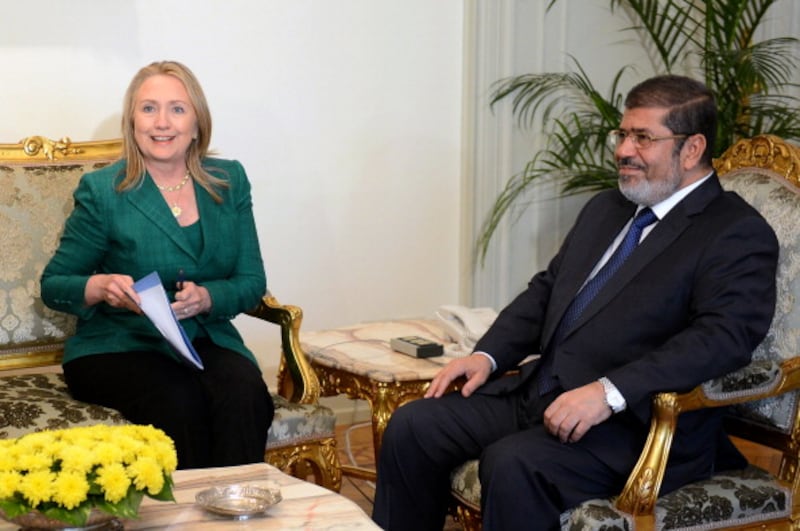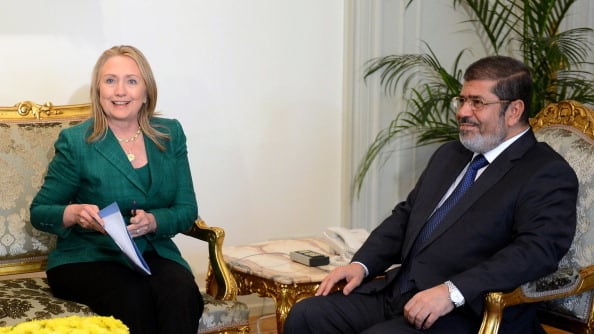The ceasefire is a relief in itself, but the way we got to it suggests a big opportunity for President Obama, perhaps the biggest since Henry Kissinger's "shuttle diplomacy" of 1974, after the October War, and for remarkably similar reasons. The challenge for the U.S. is to act quickly: one can almost feel Israelis and Palestinians molting; Obama and Secretary Clinton should aim for a formal “disengagement of forces” agreement before skins harden.What’s familiar here?
1. Egypt is the crucial Arab country. By far the most important fact of the past four days is that Egypt's President Morsi, the leader of the Muslim Brothers, worked closely with Secretary Clinton to restrain Hamas, engage Israel, and restore quiet. According to the preliminary terms of the understanding, any violations of the quiet would be brought to Egypt for adjudication. This is not what Likud politicians and neocon strategists, railing against jihadists, would have predicted: even Avigdor Lieberman was reduced to thanking Morsi profusely at a ceremonial press conference last night.

It may be too early to grasp the full implications of this new American-Egyptian reciprocity. Morsi is not John Stuart Mill. But it is not too early for Obama to draw Morsi closer, say, by inviting him to the White House, thanking him publicly, and exploring ways of expanding areas of cooperation, from economic infrastructure to Libya. Our working hypothesis must be that Morsi, like the Nasserite Sadat in 1974, sees himself not only as a nominal leader of a pan-Arab movement, and advocate for Palestinian grievances, but as the president of a poor, difficult, yet central country, with interests that go beyond any ideology. Without America and the IMF, Tahrir Square might soon be filling with hundreds of thousands protesting the cost of bread; the army, he knows, is still there to pick up the pieces. Morsi—just in his provisional display of pragmatism—has handed Obama another opening to put himself on the right side of the Arab street.
2. Military force has invited a bloody stalemate. Israelis proved they could win any full-scale war, but lost the conviction that military hegemony and intimidation amount to a security strategy. For years, Israelis were convinced by rightist leaders, reinforced by military slang, that all they have to do is “mow the lawn” every few years. "Security"—that is, complacency with the status quo, the belief that Israel could dictate the terms of negotiations (if negotiations were ever really necessary)—derives from an ultimate capacity to beat Palestinians into submission and keep “Western opinion” off-balance. The models were Lebanon in 1982 and Defensive Shield in 2002-4.
This weekend, in spite of Wednesday night's joyful ushering in of quiet, Israelis are waking up dismayed and confused. It's dawned on them that "deterrence"—the sheer ability to scare Palestinians—works until it doesn't. Now it doesn't.
Yes, the radio is full of government spokesmen (I just heard Finance Minister Yuval Steinitz) reassuring the public that the goal of the attack was “limited,” namely, to force Hamas to "pay a price," "restore deterrence," and destroy Hamas war-making capabilities. But people, especially in Israel’s south, know spin when they hear it: Kadima leader Shaul Mofaz, who was Defense Minister during Defensive Shield, pronounced Hamas the "victor" on television Wednesday night.
In any case, if the strategy is “deterrence,” a draw just isn’t good enough. And the real reason "deterrence" doesn't work is that Israeli military victory against Hamas is imaginable only if unimaginable things go with it. You can't make good on the ultimate threat without, one, reoccupying Gaza, which Israelis want as much as Americans want to reoccupy Baghdad, two, foiling American diplomatic interests in the rest of the region, when the president is no longer hostage to AIPAC, three, risking Egyptian intervention, or at least losing the peace treaty, four, igniting the West Bank and watching the Palestine Authority collapse, five, risking an Intifada in Israeli Arab towns, six, risking the collapse of Jordan, which means missiles on the Jordan, seven, precipitating missiles from Hezbollah. Need I go on?
The problem with scaring Arabs, it turns out, is not just Western opinion but powerful, infuriated Arabs—another lesson like 1973. After 1967, too, Israel's policy was hold the conquered land—what Dayan had called "security borders"—and threaten massive retaliation; the IAF even bombed the outskirts of Cairo, which brought an end to the War of Attrition. In October 1973, after weeks of bloodshed, Israel had the Egyptian Third Army surrounded and was threatening to decimate it. But for reasons not worth going into here, Israeli leaders, under firm American pressure, stepped back from that brink. "The world" would not permit this: suddenly, "the world" mattered, not only American diplomacy, and the European intelligentsia, but surprisingly, Arabs who were prepared to fight what they perceived to be injustice.
3. American patronage and pressure is the heart of any peace process. Netanyahu, and even some ingenuous pundits, are bragging about how Israel and America have never been closer. With Republican demagogues sidelined, however, the Israeli tail is no longer wagging the American dog: Netanyahu is giving Obama 29 standing ovations. The dog, moreover, has learned that if you try to bury the Middle East conflict, it will rise up and bite you when you least expect it.
Obama (justifiably) backed up Israel's right to defend itself against missiles and, if you weren't paying close attention, sounded like he was still fighting for Florida and Ohio. But this is deceiving. It was Obama who insisted on de-escalation and everybody saw this. He is clearly in the driver's seat. Netanyahu and Lieberman had inclined toward a ground invasion, for which 30,000 troops were massed, to get better terms in any ultimate ceasefire agreement; by all accounts, commanders in the field were twice notified that they'd be given orders to go ahead imminently. Obama, in these same accounts, said no. Stop shooting. Secretary Clinton flew in to reinforce the point. Leave the end-game to America; Clinton and Morsi will work out the details. Trust us—or at least don't dare cross us. Barak was the first to capitulate.
By the way, Kissinger, too, had first bought into the idea that Nixon should simply give Golda Meir's government unconditional backing, that is, prior to the fall of 1973. Then, as now, smug policy analysts told the U.S. administration that the conflict was impossible to solve, or at least not worth presidential time. Besides, the parties had to want peace more than the U.S., while Israel could be counted on to advance American interests and maintain the status quo. Wrong.
4. Economic normalization brings stability; it cannot be supposed a sign of weakness. The first step forward must be the removal of economic siege. In the spring of 1973, Israel had the chance to allow Egypt to re-open the Suez Canal. Israel refused, fearing this would "reward" Egypt, insisting that the problem was Egypt’s determination to destroy the state, and signaling that Egypt would have be reconciled to Israel annexing parts of the Sinai.
Now, as in the period after 1973, Israel is agreeing to do what war could not prevent but might have prevented a war. Ironically, the Gaza crossings will be fully opened under, of all things, Egyptian supervision, with (one may safely guess) international monitors. Israel is also, by implication, engaging with Hamas as a negotiating partner.
Hamas is telling everyone how satisfied they are with the agreement and of their intention to honor it. Israeli leaders, including Likud leaders, are meanwhile going on television to defend their new "realism" and the importance of seeing beyond purely military solutions. Of course, Netanyahu and Lieberman don't have Netanyahu and Lieberman accusing them of cowardice and promising to root out the Hamas regime. But this only makes Obama’s job easier.
How, then, should Obama not miss the chance to not miss the opportunity? True, he should continue just what he's been doing: engage Egypt, publicly provide Israel defensive means and privately show Netanyahu who's boss, speak of realizing the just demands of all sides. But there are things to do in the next couple of weeks.
Abbas is going to the UN General Assembly on November 29th, to upgrade Palestine’s status to an “observer-state,” a move the U.S. cannot veto in the Security Council, and Abbas desperately needs to reassert his "relevance." Hamas leader Haniya has reportedly just called Abbas to encourage the move. Why, for God’s sake, should Obama not announce that he will support Abbas, at least in principle, and meet with him after the vote?
Correspondingly, Obama should find a convenient occasion to acknowledge and support the principles Olmert and Abbas arrived at in 2008; and he should hint that U.S.-led negotiations will recommence on that basis. He should, in parallel, appoint a new Middle East negotiator with unimpeachable credentials and international prestige—like Kissinger was for Nixon. I suggested Bill Clinton; it has to be someone too big to fail. He then should publicly encourage Israel to release more prisoners, and privately insist that Marwan Barghouti, the only leader capable of unifying all factions, be among them.
Finally, Obama should move quickly to bring Israel and Turkey to a formula that will allow them to normalize relations. Israel and the U.S. will need all the regional mediators they can get. If Gaza reopens to the world, what exactly are Turkey and Israel quarreling about that doesn’t pale next to their common interests?
Obama, in short, must turn the ceasefire into a formal "disengagement of forces" agreement with Hamas, like the agreement Kissinger put together on the Syrian front in 1974, while reopening the diplomatic track with the Palestinian Authority. If not him, then who, and if not now, when?






